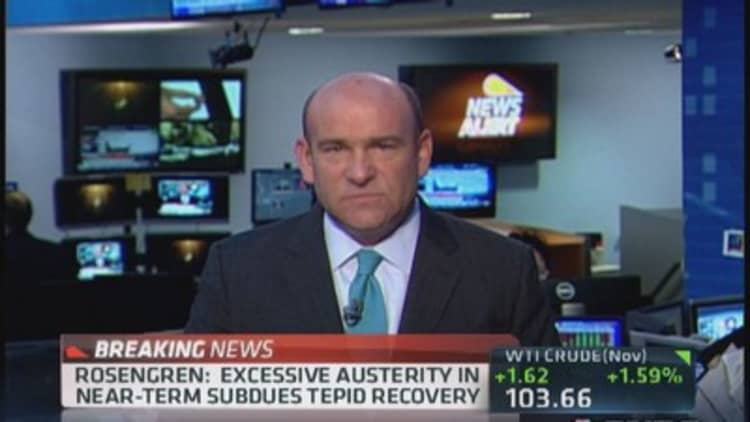The U.S. Federal Reserve should focus less on the short-term outlook for inflation and look to policies that bring inflation back up to its 2-percent target over the long term, a top Fed official said on Thursday.
"A policy that takes a longer-term perspective and is properly communicated and executed—so as to instill confidence that monetary policy will hew to a 2 percent inflation target rather than fixate on the run-rate of the past four quarters or the outlook for the next four—may better supply the longer-term comfort that households and businesses need to plan and budget," Dallas Fed President Richard Fisher told a conference on uncertainty at the bank.
The comments left it unclear exactly what Fisher, one of the Fed's most hawkish policymakers, wants the central bank to do differently in the face of persistently low inflation and low growth. Those economic conditions mean that Americans now have much lower income than they might have expected just five years ago, he said.
(Read more: First a default, then a depression? Some think so)
A longer view on inflation targeting "would reduce the uncertainty that monetary policy as it is currently conducted spawns and would be more effective in doing its part to assist in economic expansion," he said in the text of remarks to a conference at the Dallas Fed on uncertainty.

Fisher, a persistent critic of the effectiveness of the Fed's current super-easy monetary policy, reiterated his view that the Fed should limit its use of bond-buying to boost the economy.
By deciding unexpectedly last month against trimming its $85-billion-a-month bond-purchase program, the Fed made the future path of policy more uncertain, Fisher said. Fisher has said he opposed the decision, and that he was not the only policymaker to make that argument.
"Uncertainty matters," he said, "A lot."
He pointed to the looming potential of a U.S. default should lawmakers fail to authorize an increase in the nation's debt limit later this month. A standoff between Congressional Republicans and the White House over the budget has already led to a partial government shutdown.
The Treasury says it will run up against the $16.7 trillion debt limit around Oct. 17.
If the U.S. government defaults, he said, "the unthinkable will have become real, and the 'full faith and credit' of the United States will be a mirage rather than an accepted fact," he said. That kind of event could deliver a hit to the U.S. economy much like the Great Depression and the recent financial crisis, he said.
"The world—or, at least, our thinking about the world—is never the same again," he said.
(Read more: The government shutdown probably kills the 'Octaper')
Citing the research of the centrist chief of the San Francisco Fed, Fisher said that the effects of the Fed's asset purchase programs are uncertain and they should be used with caution, particularly with short-term rates so low.
The Fed has kept its target for overnight borrowing between banks near zero since December 2008, pushing borrowing costs to their lower bound. It has also bought trillions of dollars in long-term securities to push borrowing costs down further.
"Paradoxically, once the lower bound on interest rates is binding, a less-than-usually aggressive monetary policy response may be appropriate," Fisher said.
Separately, in San Diego, San Francisco Fed President Williams said the Fed should keep monetary policy "very accommodative" for quite some time, with rates pinned at zero until late 2015.
Meanwhile in St. Louis, Fed Gov. Jerome Powell, speaking at a community banking conference, said financial regulators must take care not to over-burden community banks with costly rules, which could unintentionally hinder lending activity that is vital for small business growth and job creation.
Powell did not mention the outlook for the U.S. economy and monetary policy in his prepared remarks.
—By Reuters.

